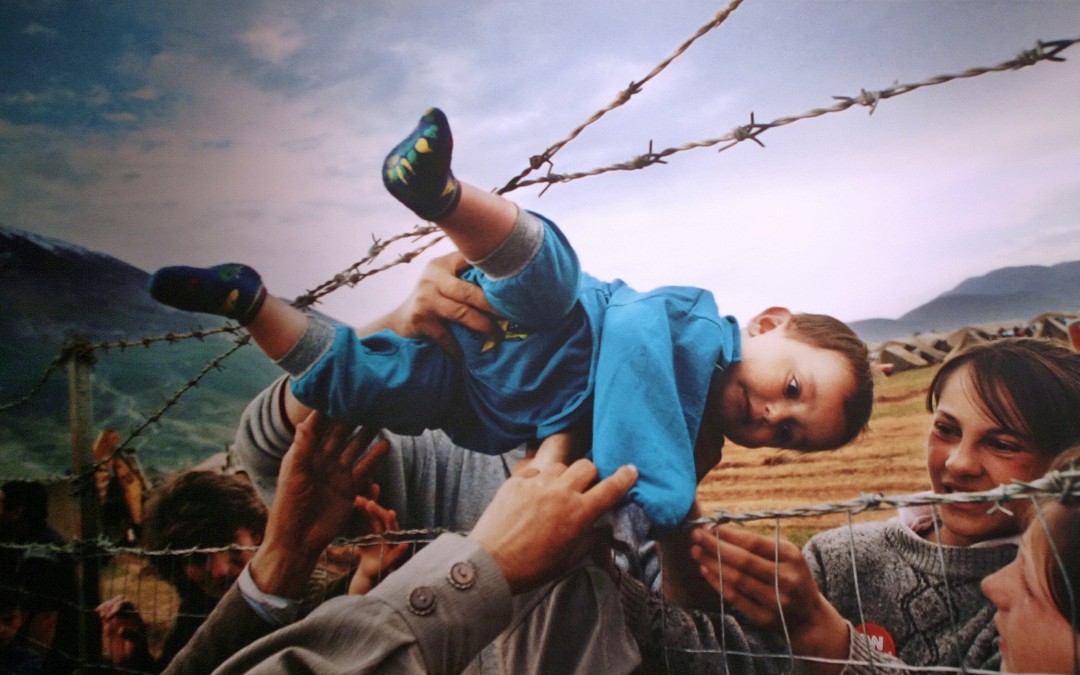It’s easy to disparage those calling for a more humane approach to the refugee crisis.
There’s The Spectator‘s line about moral grandstanding and, locally, Chris Kenny’s call for sobriety in The Australian: ‘Emotion, moral vanity, political posturing and good intentions won’t be much of a guide when it comes to making the right decisions and delivering the best results’.
Such opinion writers get so much traction because they’re essentially correct. Of course, compassion alone is not enough: money, personnel, resources, diplomacy, aid, accommodation and many other things are required.
The implication is that ‘moral grandstanding’ – or what I would call a sense of humanity – creates a kind of junk energy that not only doesn’t help solve the crisis, but makes it worse by focusing attention on an entirely unhelpful element of the problem.
In other words, time spent complaining about how callous everyone else is, is time spent on an entirely unproductive (and self-serving) pursuit.
Australia has long led the world in cruelty towards refugees, so the experiences here provide a good arena to test these claims. The fact that both major parties support harsh measures would suggest that those calling for a more humane approach have been largely ineffective. In fact, it might be having the opposite effect.
Referring to the detention facilities as ‘torture camps’, one ‘senior source’ within the Department of Immigration and Border Protection explained to The Saturday Paper how the government actually benefits from news about sexual assaults, rape, torture and deaths within these centres: ‘ … the more the stories get out about how awful it is, from the government’s perspective, the more it serves as a deterrent.’
This doesn’t mean that calls for a more compassionate approach should be abandoned, but those who are outraged by the treatment of refugees, both here and in Europe, need to acknowledge that putting compassion at the centre of the argument simply hasn’t worked.
There are a lot of reasons for migration – work, life change or even marriage! With the diverse range of immigration reasons, there comes the law and the prerequisites for moving to another country. As there are multiple law firms (like Mayfair Immigration in the UK) to assist in this regard, it should be fairly easy to undergo this process. However, we live in a society in which economic rationalism predominates and those who simply discount or dismiss economic arguments around migration policy risk being ignored. There is something abhorrent about reducing the life of an asylum seeker to a dollar amount on a balance sheet. For this reason, it’s important that an economically-minded approach doesn’t replace calls for more compassion, but operates alongside it.
The first part of this argument should focus on the cost of the current Fortress Australia policies. Take, for example, the recent announcement that Cambodia won’t be accepting any more refugees under the resettlement plan with Australia. As it currently stands, only four refugees have been successfully resettled at a cost of $55 million – that’s over $13 million per person.
But that’s just a fraction of the total cost. Asher Hirsch, a Policy Officer with the Refugee Council of Australia, has comprehensively shown just how ridiculously expensive the government’s current policies are:
An analysis of last year’s budget found that in the 2014-15 financial year, the Australian Government spent $2.91 billion on detention and compliance-related programs for asylum seekers who arrived in Australia by boat. [ … ] To put Australia’s spending in perspective, the total expenditure for the United Nations High Commissioner for Refugees (UNHCR) in 2014 was AUD$3.72 billion.
One of the challenges with getting this message heard is that both major parties support these policies in all their essential elements. It’s left, therefore, to minor parties, like the Greens, to highlight the economic absurdity of Border Force and off-shore indefinite detention.
So, what then, is the economically acceptable (and hopefully beneficial) alternative to the current state of affairs? Firstly, Australia ought to substantially increase the number of refugees it accepts every year. Last year, Australia resettled 13,570 refugees, which is woefully inadequate in a world in which 59.5 million people are displaced. The Greens have proposed that Australia take a further 20,000 Syrian refugees – this seems a good place to start.
In a nation led by wooden politicians seemingly incapable of communicating any sort of economic policy that challenges the standard surplus-equals-good-deficit-equals-bad approach, explaining the benefits of increasing Australia’s refugee in-take must be decidedly daunting.
But Messrs Abbott and Shorten, with their penchant for sloganeering, would do well to borrow a line from Patrick Carvahlo, a research fellow at the Centre for Independent Studies, who argues convincingly that ‘migrants lift the three ‘Ps’ of economic growth – population, participation and productivity.’
Refugees might not be the kind of skilled migrants the Department of Immigration usually chooses to let in, but their experiences often equip them with certain skills and attitudes once resettled.
And if all this is too arbitrary to convince the naysayers, Ms Hirsch points to a recent report by AMES and Deloitte Access Economics that found ‘that the resettlement of 160 Karen refugees from Burma in the small town of Nhill in regional Victoria contributed $41.49 million to the local economy.’ There’s no shortage of similar towns throughout Australia that need workers.
This is all compelling evidence, but it’s hardly new. Indeed, economists have long made the case for more migration as a means of growing the economy. It’s perhaps a mark of our political leaders that, rather than attempt to sell the policy that will most benefit the Australian economy, they are reduced to pandering and cultivating peoples’ basest fears.
But it’s these fears that those arguing for a more humane refugee policy need to assuage, and calling for a more compassionate approach hasn’t worked. It’s time to try something new – something that will hopefully resonate.
(This was originally published in Eureka Street on 8th September, 2015.)

